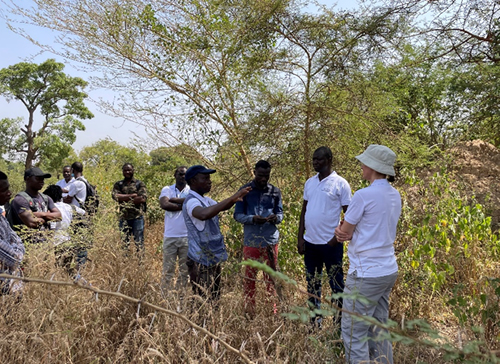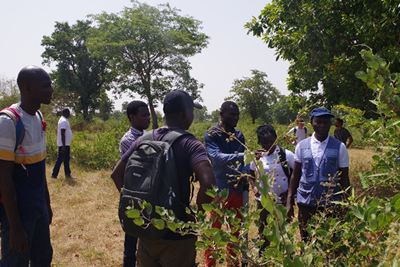Project Team: Guuroh, R.T., Adu-Bredu, S., Okyere-Agyapong, E., Dembele, F., Larbi S., Tanoah, D., and Nancy Karikari
Guuroh, R.T., Adu-Bredu, S., Okyere-Agyapong, E., Dembele, F., Larbi S., Tanoah, D., and Nancy Karikari
Other project partners/ collaborators:
- Biodiversity / Systematic Botany Group, University of Potsdam, Germany
Center for Environmental Systems Research, University of Kassel, Germany
University Joseph Ki-Zerbo (UJKZ), Ouagadougou, Burkina Faso
Institute for Environment and Agricultural Research (INERA), Ouagadougou, Burkina Faso
University Abdou Moumouni (UAM), Niamey, Niger
Donor agency:
German Federal Ministry of Education and Research (BMBF) through West African Science Service Centre on Climate Change and Adapted Land Use(WASCAL) WRAP 2.
Duration: April 2021 to March 2024
Background
In developing countries, agriculture and deforestation are the main sources of greenhouse gas (GHG) emissions (90% of total emissions). The extension of croplands is expected to be exponential and lead to significant reduction in forest cover. Food production systems contribute significantly to global warming and are responsible for 19–29% of global GHG emissions. There is inadequate knowledge about how much greenhouse gases are released by different agricultural systems and management practices. Such data and even future predictions are essential in order to provide policymakers and managers with a clear basis for decision-making. This is the goal of the GreenGaDe project which brings together specialists in agronomy, forestry, modelling, environmental chemistry and monitoring, and sociology from Germany, Burkina Faso, Ghana and Nigerto work together. The scientists examine and compare different land use systems in West Africa, including forests, open savannas, fallow lands and crop fields along a climatic gradient from the sahelian region of Niger through the savannas of Burkina Faso and Ghana to the Forest areas of Ghana.
and lead to significant reduction in forest cover. Food production systems contribute significantly to global warming and are responsible for 19–29% of global GHG emissions. There is inadequate knowledge about how much greenhouse gases are released by different agricultural systems and management practices. Such data and even future predictions are essential in order to provide policymakers and managers with a clear basis for decision-making. This is the goal of the GreenGaDe project which brings together specialists in agronomy, forestry, modelling, environmental chemistry and monitoring, and sociology from Germany, Burkina Faso, Ghana and Nigerto work together. The scientists examine and compare different land use systems in West Africa, including forests, open savannas, fallow lands and crop fields along a climatic gradient from the sahelian region of Niger through the savannas of Burkina Faso and Ghana to the Forest areas of Ghana.
Goal and objectives
The overall goals of the project are:
1) Provide baseline data and predict the dynamics of greenhouse gas emissions and carbon stocks in different lands uses at national and regional scales in West Africa
2) Evaluate GHG emissions and carbon storage dynamicsrelated to different land uses at national and regional scales across West Africa
3) Guide national and regional climate change adaptation policies and strategies in west Africa
4) Develop strategies to accelerate the implementation of climate smart agriculture approaches among small holder farmers.
The scientific research objectives of the project are:
1) Quantify greenhouse gases emitted under different land uses systems at local, national and regional levels
2) Measure carbon sequestration under different land uses systems at local, national and regional levels
3) Model GHG emissions from the agricultural sector at the local, national and regional scale
4) Build a spatial model to predict the potential carbon sequestration in 2030 and 2050
5) Explore knowledge and local innovations favoring GHG emissions and carbon sequestration
CSIR-FORIG leads work package 3 focusing on the assessment of carbon emission and fixation of plants but also contributes to all the other work packages including measurement of GHG emission in agricultural fields, measurement of carbon pool dynamics in soils and grasses, spatial modelling of GHG and carbon dynamics as well as investigating farmers’ agricultural practices in relation to GHG emissions.


